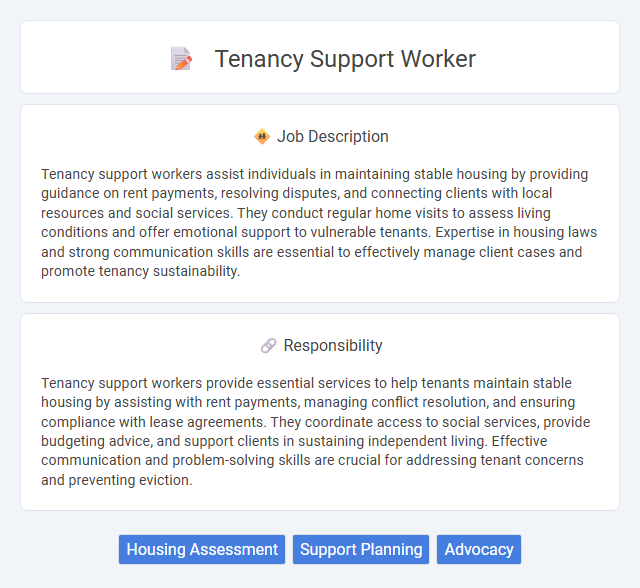
Tenancy support workers assist individuals in maintaining stable housing by providing guidance on rent payments, resolving disputes, and connecting clients with local resources and social services. They conduct regular home visits to assess living conditions and offer emotional support to vulnerable tenants. Expertise in housing laws and strong communication skills are essential to effectively manage client cases and promote tenancy sustainability.
Individuals experiencing housing instability, mental health challenges, or financial difficulties will likely find suitability in the role of a tenancy support worker due to the job's emphasis on providing emotional support and practical assistance. Those with strong communication skills and empathy will probably be better equipped to navigate complex tenant-landlord relationships and advocate for vulnerable clients. People who thrive in dynamic, problem-solving environments and demonstrate patience may have a higher probability of success in this role.
Qualification
Tenancy support workers typically require qualifications in social work, housing, or related fields such as psychology or community development, often at a diploma or degree level. Practical experience in homelessness services, mental health support, or welfare rights complements formal education, enhancing effectiveness in managing tenancy sustainment. Training in conflict resolution, benefits advice, and legal housing frameworks is essential to support vulnerable individuals in maintaining stable housing.
Responsibility
Tenancy support workers provide essential services to help tenants maintain stable housing by assisting with rent payments, managing conflict resolution, and ensuring compliance with lease agreements. They coordinate access to social services, provide budgeting advice, and support clients in sustaining independent living. Effective communication and problem-solving skills are crucial for addressing tenant concerns and preventing eviction.
Benefit
Tenancy support workers likely provide crucial assistance to individuals struggling with housing issues, increasing the probability of stable living conditions. Their role may improve clients' ability to maintain tenancies, reducing eviction rates and homelessness risks. This support probably fosters greater independence and enhances overall community well-being.
Challenge
A Tenancy Support Worker likely faces challenges in balancing the diverse needs of tenants with limited resources, requiring strong problem-solving skills to address housing instability and conflict resolution. Navigating complex social and legal systems can present ongoing difficulties, demanding adaptability and perseverance. The role probably involves managing high-stress situations while maintaining empathy and professionalism to support vulnerable individuals effectively.
Career Advancement
Tenancy support workers play a crucial role in assisting clients with housing stability and navigating rental agreements, which builds strong interpersonal and problem-solving skills highly valued in social services. Gaining experience in tenancy support opens pathways to advanced roles such as housing officer, social worker, or community development coordinator, with increased responsibilities and higher salaries. Pursuing relevant certifications and specialized training in housing law, mental health, or welfare benefits further enhances career prospects and job market competitiveness.
Key Terms
Housing Assessment
A Tenancy Support Worker specializing in Housing Assessment conducts comprehensive evaluations of clients' housing needs, ensuring suitable accommodation is identified based on personal circumstances, financial capacity, and health requirements. They collaborate with housing authorities, social services, and landlords to facilitate access to appropriate housing options and support services. Their role is crucial in preventing homelessness by assessing risk factors and providing tailored guidance for sustainable tenancy arrangements.
Support Planning
Tenancy support workers develop personalized support plans to help tenants maintain stable housing by addressing individual needs such as budgeting, accessing community services, and managing day-to-day living skills. These plans are tailored to promote independence, prevent eviction, and improve overall quality of life for vulnerable populations. Continuous assessment and collaboration with social services ensure that support plans adapt to changing circumstances and tenant progress.
Advocacy
A tenancy support worker provides critical advocacy for tenants facing housing challenges, ensuring their rights are upheld and their voices are heard in negotiations with landlords or housing authorities. They assist clients in navigating complex housing laws and accessing essential services, promoting housing stability and preventing eviction. Skilled advocacy from tenancy support workers contributes to improved tenant well-being and long-term community retention.
 kuljobs.com
kuljobs.com